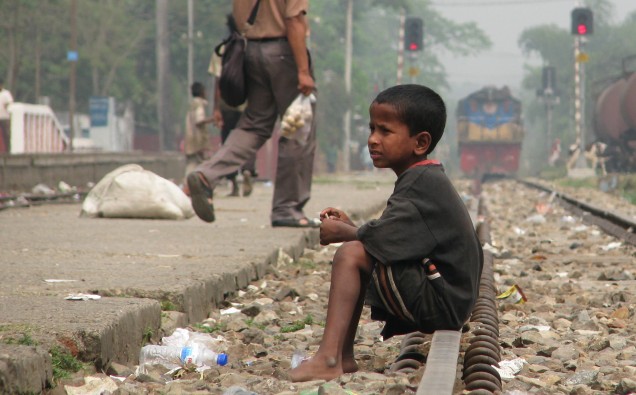
A child sits on a railway station in Bangladesh Photo by Md. Tanvirul Islam/Wikimedia Commons
The world is falling way behind in realizing people’s economic potential – in countries at all stages of economic development, says the World Economic Forum’s Human Capital Report 2017.
The latest update faults a number of reasons including ineffectiveness in terms of deployment of skills throughout the workforce, development of future skills and adequate promotion of ongoing learning for those already in employment.
These failures to translate investment in education during the formative years into opportunities for higher-quality work during the working lifetime contributes to income inequality by blocking the two pathways to social inclusion, education and work, the report argues.
The 2017 report measures 130 countries against four key areas of human capital development; Capacity, largely determined by past investment in formal education; Deployment, the application and accumulation of skills through work; Development, the formal education of the next generation workforce and continued upskilling and reskilling of existing workers; and Know-how, the breadth and depth of specialized skills-use at work. Countries’ performance is also measured across five distinct age groups or generations: 0-14 years; 15-24 years; 25-54 years; 55-64 years; and 65 years and over.
One of the most enlightening findings is that 62% of human capital has now been developed globally.
Moreover, only 25 nations have tapped 70% of their people’s human capital or more. With the majority of countries leveraging between 50% and 70% of their human capital, 14 countries remain below 50%.
Interestingly, the report concludes that accumulation of skills does not end at a formal education, and the continuous application and accumulation of skills through work is part of human capital development. All too often economies already possess the required talent but fail to deploy it.
In a statement the World Economic Forum noted that the problem of under-deployment of skills among the young also affects those coming towards the end of their working life. Meanwhile, few among those currently in employment – across all age groups –are gaining access to higher skilled work and opportunities to enhance know-how.
“The Fourth Industrial Revolution does not just disrupt employment, it creates a shortfall of newly required skills. Therefore, we are facing a global talent crisis. We need a new mind-set and a true revolution to adapt our educational systems to the education needed for the future work force,” said Klaus Schwab, Founder and Executive Chairman, World Economic Forum.
“Countries’ strategies for developing human capital should vary according to demographic structure. However, every country risks creating lost generations if they fail to adopt a more holistic approach to nurturing talent that takes into account a proactive approach to managing the transition from education to employment and to ongoing learning and skills acquisition,” said Saadia Zahidi, Head, Education, Gender and Work, World Economic Forum.
“Skills are the fundamental unit of human capital. Knowing which skills are most resilient, most persistent, and most likely to remain relevant through technological innovation and economic change is key to successfully upskilling and reskilling workers. Using our data to arm governments and broader policy communities with a richer understanding of skills dynamics can and should fuel more nuanced and strategic investments in building human capital for the future,” said Guy Berger, LinkedIn Economist.
The top 10 is topped by smaller European countries – Norway (1), Finland (2), Switzerland (3) – as well as large economies such as the United States (4) and Germany (6). Four countries from East Asia and the Pacific region, three countries from the Eastern Europe and Central Asia region and one country from the Middle East and North Africa region are also in the index top 20.
South Asia and Africa lag far behind developed countries in terms of developing their human capital.














